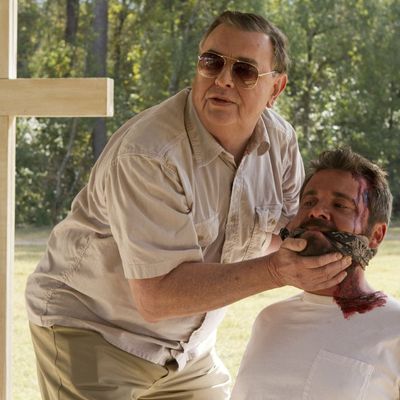
Full disclosure: While director Ti West has become something of a brand name in the indie horror world over the last few years with movies like The House of the Devil and The Innkeepers, I haven’t liked a single film of his. For all their retro ornamentation, they’ve felt singularly hollow and unimaginative, not to mention profoundly, irritatingly un-scary. So maybe it makes sense that I found parts of The Sacrament more effective than anything else he’s done to date, as it’s probably the least genre of his movies. But don’t tell West that; I’m pretty sure he still thinks he’s made a horror flick.
The film is positioned as a fake VICE documentary, which gives a light spin on the found-footage subgenre. Freelance photographer Patrick (Kentucker Audley) discovers that his sister has joined a mysterious commune and moved to a remote country, and heads down to find her, bringing along journalist Sam (A.J. Bowen) and cameraman Jake (Joe Swanberg). After a helicopter drops them off in the middle of nowhere, the trio are herded onto a truck and taken to Eden Parish, a Jonestown-like settlement where Patrick’s sister Caroline (a typically excellent Amy Seimetz), a recovering addict, greets them with casual, fresh-faced enthusiasm. They walk around Eden Parish and interview the diverse congregants — some kids from the hood, an Australian artist from Brooklyn, etc. — about what draws them to this place. The parishioners call it a paradise and talk about how they’re all one big family, but there’s little sense that this place is in any way paradiselike or even familial. It just appears to be a big field with a few cabins strewn around it.
The Sacrament spends an uncommonly long time exploring Eden Parish, and yet we get almost no sense of the place. That is, until we meet Father (Gene Jones), who rules over the settlement and comes off like a paternal cross between a rock star and a glad-handing southern politician. When Sam gets to interview Father before the whole congregation, the film becomes briefly electric as the cult leader brilliantly swats away questions with empty words and cozy platitudes (“What we lack in modern comforts, we make up for in humanity.”). Gene Jones, previously seen in one memorable scene from No Country for Old Men, briefly gives the film the oomph that all its roving perspective and direct-address asides and on-camera interviews couldn’t.
For all of Father’s oily pronouncements, our heroes soon start to see the dark side of Eden Parish, all of it telegraphed well ahead of time by Tyler Bates’s boomingly intrusive, John Carpenter–esque score. West seems to think he’s telling a story other than the one we’re watching onscreen: He’s trying to terrify us, but what we’re watching is more sad than scary, more depressing than pulse-raising. It might have worked if his characters were more interesting, or the situation they found themselves in less boilerplate. But his story is so rinky-dink that there’s nothing for us to grasp. Three guys show up suspicious at the doors of a cult, and their suspicions are soon confirmed; that’s about the extent of the narrative trajectory here.
(I will now more specifically spoil this thoroughly predictable movie, so beware.)
The film eventually leads to a Jonestown-like mass suicide/murder, as the Eden Parish cult members are told that, with their way of life now threatened from the outside, the only dignified option is for them all to take their own lives. (That perhaps begs an unfair, but important, question: The real-life Jonestown was “undone” by the murder of a sitting U.S. congressman, which precipitated the dispatching of the Guyanese army. But how diabolical can this place be if they’re compromised so quickly by the first three bros from VICE who show up?)
So, we watch as the parishioners drink — some of them reluctantly — an orange fruit drink laced with cyanide. Some are tearfully given syringes full of the stuff. And then we get an extended scene of men, women, and children seized with convulsions and dying agonizing deaths. West shoots this scene with a documentary immediacy that’s quite powerful. The people playing the parishioners are uniformly excellent, which is also a credit to the director. But as the scene goes on and on, it becomes exploitative and cheap, an empty attempt to create emotional resonance in a film that mostly lacks it.
Nevertheless, these scenes achieve their aim; they’re hard to shake, even after the film’s pathetic, thoroughly generic finale. The Sacrament may not be a good movie, but it has enough virtues — enough gripping, well-put-together moments — that it made me reconsider my opinion of West as a director. Maybe he’s better suited to something outside of the horror world. Maybe, freed from empty genre theatrics, he will one day make a movie that actually befits his reputation.


